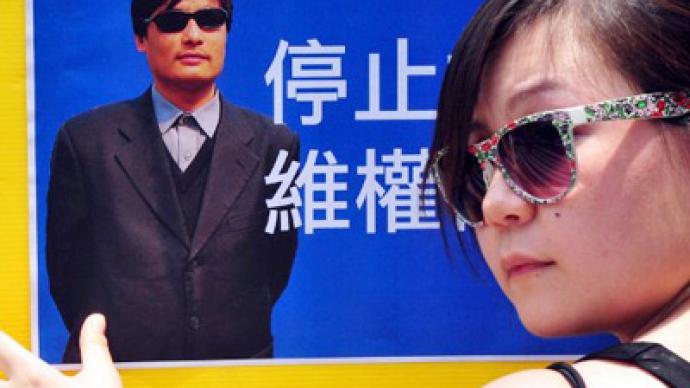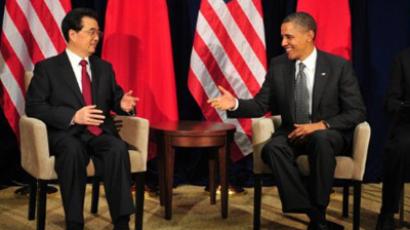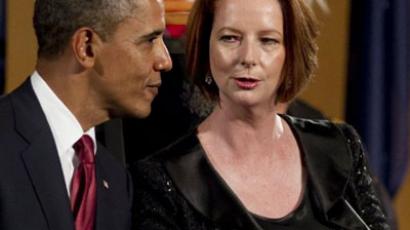Chinese activist: Game-changer in geopolitical football match?

A Chinese dissident seeking asylum in the US has overshadowed bilateral negotiations between the two countries. The case comes at a crucial time for China-US relations, raising suspicions it may have been orchestrated to serve diplomatic interests.
Officially Chen Guangcheng’s situation only serves to put strain on ties between the two nations and impede potential progress in economic and political policy. However, the two sides reached a tentative compromise on Friday after China agreed to let the blind dissident apply to study abroad.
The US Statement Department for its part said that Chen has a fellowship at an American University and expects China to take care of his travel arrangements. State Department spokeswoman Victoria Nuland said Chen’s wife and two children would be allowed to accompany him once he embarks on his fellowship.
Secretary of State Hillary Clinton reacted to the news by saying much progress had been made "to to help him [Chen] have the future that he wants.” She further described Chen’s case as extending beyond the plight of “well known activists,” but rather extended to the “human rights and aspirations of more than a billion people here in China and billions more around the world.”
Chen had previously appealed directly to the US Congress and asked to meet with Clinton, currently in China for diplomatic talks.
In a dramatic telephone call to Congress, Chen had previously said he feared for the safety of his wife and children and wanted a “rest” in the US. He left the shelter of the US embassy in Beijing on Wednesday, but regretted the decision, only realizing the full extent of the threat to his family after his departure.
The Chinese government suggested a compromise, saying that Chen could leave China by applying for a student position in the US.
They had previously struck out at the US government for “meddling” in the case and have demanded an official apology from Washington for the affront.
Coincidence or Conspiracy?
Hillary Clinton is wrapping up a diplomatic mission to strengthen economic and political ties with Beijing in what has been hailed as a high point in the countries’ relations.However, dialogue has been overshadowed by dissident Chen’s case with many questioning its coincidence with the bilateral talks. The controversial case highlights human rights violations in China and has the potential to embarrass Beijing and undermine its authority.Former CIA analyst Chris Johnson, now part of the Center for Strategic and International Studies, says in article on that organization’s website that Chinese-US relations had almost reached “the perfect storm.”He cited the case of corrupt politician Bo Xilai and alleged reports that the US was planning to sell Taiwan the F-16 fighter jet to add to its air fleet.“For the conspiracy-minded in Beijing, and there are plenty of them, they will see these things as completing the circle of a US containment strategy designed to stifle China’s rise,” said Chris Johnson.Columnist Francesco Sisci told RT that it was very possible that somebody “tried to plant the scandal as a thorn between the US and China” and that the blind activist must have had help to escape captivity.“If it was orchestrated they must have had the support of the local police and maybe also someone in America,” said Sisci.He emphasized that China-US relations were entering a “tricky time” with both sides adapting to China’s growing status as a global superpower.However, Zhang Yongjin, professor of International Politics at the University of Bristol, told RT he dismissed allegations the scandal was purposefully orchestrated."Given the high stakes in the strategic and economic dialogue that was to be held in Beijing just before the event [Cheng seeking shelter in the US embassy after escaping house arrest], I don’t believe this was a conspiracy,”he said.But while viewing the timing of the event as a “coincidence”, Zhang says “the Americans probably didn’t play this very smartly” by agreeing to take Chen into their compound.“On the surface, this is sort of an embarrassment for the Chinese. But when Chen Guangcheng came out and said he was disappointed by how the Americans had dealt with this, it became an embarrassment now more for the United States than for China really," he added.Zhang also says that Beijing’s “low profile” and “relative reticence” regarding the case proves China is not going to let it get in the way of more important matters.“In many ways, I think it’s probably not such a big deal, a big issue for the Chinese although they are probably quite irritated by the unfolding drama,” he said.“I don’t think that it stands in the way of a broad, kind of strategic economic cooperation between China and the United States,” he concluded.
Republicans target Obama over Chinese activist
US President Barack Obama’s opposition has also seized on Chen’s case, branding it as indicative of his weak foreign policy.Obama’s Republican presidential competitor Mitt Romney has branded the administration’s treatment of Chen Guangcheng’s case as a “failure.”“The reports are, if they are accurate, that our administration wittingly or unwittingly communicated to Chen an implicit threat to his family and also probably sped up or may have sped up the process of his decision to leave the embassy," Romney said at a campaign event on Thursday.He added that if reports were true, “it’s a day of shame for the Obama administration.”Obama has come under fire recently from his Republican opponents for his foreign policy. Namely for his controversial use of the killing of Osama Bin Laden as the centerpiece of his re-election campaign.Romney said Chen’s case was yet more evidence that the president has not been standing up to authoritarian governments like Syria and Iran.














